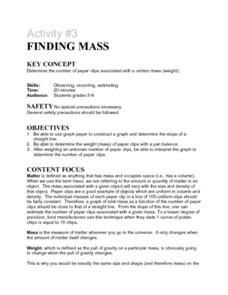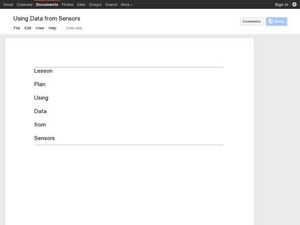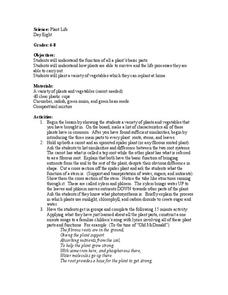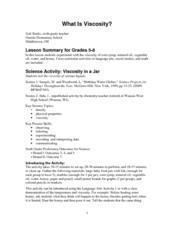Curated OER
Digestive System, a Kinesthetic Lesson
Students actively act out an aspect of the digestive tract on two parallel strips of tape on the floor 3-4 feet apart and width of classroom which represent the digestive tract.
Curated OER
Documenting Science Through an Active Inquiry Process
Students follow procedures regarding scientific data collection. In this scientific inquiry lesson, students investigate inquiry questions through research and data collection. Students use technology tools to create products that...
Curated OER
Forest Activity: Forest Layers
Students examine the forest layers and types of forests. They explore a website, read content on forest layers and the effects of environmental conditions, sumarize the characteristics of a forest type and present the information to the...
Curated OER
Activity #15 What Happens To A Liquid As Energy Is Added?
Learners model the arrangement of particles in a liquid. They use the model, to demonstrate how a gas is formed from a liquid with no increase in temperature as energy is added. Pupils model the arrangement and movement of gas particles.
Curated OER
Activity #14 Floating Bubbles
Learners comprehend that Carbon dioxide gas is relatively easy to generate. They comprehend that one way to produce it is with dry ice. Pupils comprehend that carbon dioxide gas can also be produced by combining baking soda with vinegar.
Curated OER
Activity #3 Finding Mass
Learners use graph paper to construct a graph and determine the slope of a straight line. They determine the weight (mass) of paper clips with a pan balance. Pupils weigh an unknown number of paper clips, and to interpret the graph to...
Science 4 Inquiry
Layers of the Earth
We can't dig a hole through the Earth, so how do we know about the layers beneath our feet? Scholars learn about layering through hands-on exploration of common materials. They study the characteristics of each layer and apply their...
Curated OER
Rat Round Up
Students build a device that captures and carries a pet rat safely back to its cage with out "harming" the rat or themselves. They build and experiment with wind-up or battery operated rat cat toys after predicting the outcome of their...
Curated OER
Testing for Life’s Molecules
Want to hear a joke about sodium? Na. Young scientists test various materials to identify if they include protein, starch, and glucose by using the Biuret test, iodine starch test, and Benedict's test respectively. After practicing with...
Science 4 Inquiry
Let's Get Moving
Rivers top the list of causes of erosion over time. Scholars experiment with wind, water, and ice reshaping sand. They connect the simulations facts about erosion and deposition to understand unique landforms such as the Grand Canyon and...
Curated OER
Using Data from Sensors
Beginning with a discussion about using technology to collect data, this resource includes a video about the next Mars rover as an example. Young scientists are taught that filtering is necessary before collected data can be analyzed....
Curated OER
Heat And Heat Transfer
Students role play molecules in a container as the container is heated to develop a definition of heat and temperature. They also observe demonstrations of conduction, convection, radiation, and phase transfer. Using these observations...
Curated OER
Bat Program
Students, through hands on games and activities, discover how bats live and how bats benefit ecosystems. They play a game designed to show them how echolocation works. They take a quiz to dispel some of the myths associated with bats.
Curated OER
A Habitat Is Home
Learners are introduced to the concept and components of a habitat. They discuss the key components of a habitat and describe how certain factors can cause disturbances in a habitat and change its population. Activities are leveled...
Curated OER
Capillary Action And Transpiration
Young scholars engage in a study of the concepts of biology with plants known as capillary action and transpiration. They conduct a simple experiment to demonstrate the concept. The instructional activity includes a background discussion...
Curated OER
Traveling Nitrogen
Students demonstrate and understanding of the nitrogen cycle by taking roles and interacting with others in a simulation activity.
Curated OER
Plant Life
Middle schoolers study plant parts and their functions. In this plant life lesson students participate in an activity of planting plants.
Curated OER
Ecology-Minded Garbage Plants
Students complete recycling activities to learn how ordinary garbage can create a living organism. In this recycling lesson, students take a combination of seeds from used fruits. Students water and grow the plants from the recycled seeds.
Safe Drinking Water Foundation
How Water Pollution Is Cleaned Up
As a follow-up from the previous instructional activity, young environmentalists discuss the benefits of water filtration and whether or not it's the best option. Other alternatives including air stripping, bioremediation, and...
Science 4 Inquiry
Investigating How Heat Flows
It is impossible to cool down a glass of water by adding ice. Young scientists explore heat transfer through videos, experiments, and interactive games. They quickly catch on that the water melts the ice and things aren't always as they...
Science 4 Inquiry
It's Not All Visible
Electromagnetic waves travel though empty space, something no other wave type can accomplish. Young scientists learn more about the entire spectrum of electromagnetic waves. They sort cards and apply their knowledge to create models of...
Science 4 Inquiry
Temperature of Inner Planets
Mars, Earth, and Venus contain atmospheres that generate weather. Young scientists explore the temperature of inner planets. They create a model simulating the greenhouse effect before researching and answering guided questions to...
Science 4 Inquiry
Levitation Engineers: Exploring Forces
Levitation tricks have been documented from the early 1900s, so how do they do it? Scholars learn about the force of magnetism in an attractive resource. They watch videos and design experiments to understand the strength and...
Curated OER
What Is Viscosity?
Students experiment with the visocosity of corn syrup, mineral oil, vegetable oil, water, and honey. They research viscosity before beginning. Pupils draw the conclusion that the marble sinks more slowly in the liquids with greater...

























